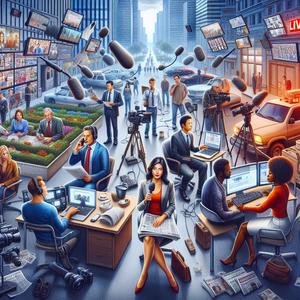
Exploring Vibrant Careers in Media and Entertainment: A Guide to Roles, Responsibilities, and Requirements
The media and entertainment sector is an exhilarating domain, rich with diverse career paths that cater to a vast array of skills, interests, and educational backgrounds. As this industry continuously adapts to technological innovations and evolving audience expectations, it’s crucial for aspiring professionals to comprehend the spectrum of opportunities available. From traditional roles such as news anchors and journalists to modern positions including digital content creators and social media strategists, this guide delves into various careers, outlining their distinct responsibilities, educational prerequisites, and salary expectations. For instance, while some roles necessitate strong foundational skills in journalism and communication, others thrive on creativity and digital expertise. This article illuminates the current landscape of media and entertainment careers, emphasizing educational pathways, industry trends, and growth prospects. With job growth in this sector projected to remain robust, now is a fantastic time to consider a career in media and entertainment.
Job Summaries:
News Anchor:
- As the face of television news, news anchors present timely information.
- News anchors require exceptional verbal communication skills.
- A degree in journalism or communications is often necessary.
- The demand for trustworthy news sources underscores the significance of this role.
- This role is essential in keeping the public informed.
Publicist:
- Publicists manage the public personas of clients
- Crafting press releases
- Orchestrating media events
- A bachelor's degree in communications, public relations, or marketing is typically essential
- Their ability to influence public perception makes them pivotal in today's media landscape.
Video Editor:
- Video editors transform raw footage into polished content for various platforms.
- They must possess a creative vision and proficiency in editing software.
- Their role is increasingly vital as demand for quality digital content rises.
Media Planner:
- Tasked with developing advertising strategies
- Media planners research target audiences
- Determine optimal ad placements
- A background in marketing or advertising is crucial for success
- Strong analytical skills are crucial for success in this data-driven role
Digital Content Creator:
- Digital content creators craft engaging material for online platforms.
- They require knowledge of SEO and social media trends.
- A degree in communications or marketing enhances their effectiveness.
- They help boost brand visibility in the digital realm.
Broadcast Technician:
- Broadcast technicians are responsible for the technical aspects of media production.
- They ensure high-quality transmission of programs.
- A technical degree or certification in broadcasting technology is often a prerequisite for this role.
Public Relations Specialist:
- These specialists manage communication between organizations and the public.
- Focusing on building positive images through targeted campaigns.
- A degree in public relations or communications is typically required to navigate this essential role.
Social Media Manager:
- Social media managers enhance brand awareness through strategic engagement across various platforms.
- Strong writing skills, creativity, and familiarity with analytics are critical for success in this dynamic position.
Photographer:
- Photographers capture compelling images for diverse applications, from journalism to advertising.
- While a degree in photography can be beneficial, a robust portfolio often speaks louder than formal education in this creative field.
Content Strategist:
- Content strategists create and oversee content plans that align with business objectives.
- Their expertise in analyzing market trends is essential for crafting narratives that resonate with audiences.
Media Buyer:
- Media buyers negotiate purchasing advertising space across channels.
- They require analytical skills and typically a degree in marketing or advertising.
- Their role is vital in optimizing advertising budgets.
Graphic Designer:
- Graphic designers communicate ideas through visual concepts.
- A degree in graphic design is necessary.
- A strong portfolio is essential.
- Their creativity significantly shapes branding efforts across various media.
Animator:
- Animators create visual effects for films and video games
- Requiring a solid grasp of motion graphics
- A degree in animation is essential
- A compelling portfolio is essential for securing opportunities in this field
Copywriter:
- Copywriters develop persuasive content for marketing materials.
- Strong writing skills and a background in marketing or communications are advantageous for crafting compelling messages.
Sound Engineer:
- Sound engineers oversee audio production.
- Ensuring high-quality recordings.
- A degree in audio engineering is key to excelling in this role.
- Experience with sound equipment is also essential.
Casting Director:
- Responsible for selecting actors for productions
- Casting directors need strong communication skills
- An eye for talent is essential
- Networking and experience often prove more valuable than formal education
- This is a competitive arena
Researcher:
- Researchers verify information for media content
- Require strong analytical skills
- Require a background in journalism
- Critical for maintaining accuracy in storytelling
- Critical for maintaining credibility in storytelling
Event Coordinator:
- Event coordinators organize promotional events.
- Managing logistics and vendor relationships.
- Strong organizational skills are necessary.
- Relevant experience is necessary for creating impactful experiences.
Media Director:
- Media directors oversee campaigns
- Managing both creative and analytical teams
- A degree in marketing or communications is crucial
- Extensive experience is crucial in shaping brand narratives
Television Producer:
- Television producers manage show production.
- They oversee budgets, schedules, and crew hiring.
- A degree in film or television production is typically required.
- This degree helps navigate the complexities of bringing stories to life.
These descriptions reflect the vast array of opportunities within the media and entertainment industry, encouraging readers to explore current openings and discover paths that align with their passions and skills. With the sector poised for continued growth, the demand for skilled professionals is robust, making this an exhilarating time to embark on a career in media and entertainment. Aspiring candidates should stay informed about industry trends, salary expectations, and educational requirements to strategically position themselves for success in their chosen fields. Engaging with success stories from industry professionals and utilizing interactive tools can further enhance understanding and inspire future endeavors in this dynamic landscape.
Explore More Jobs

